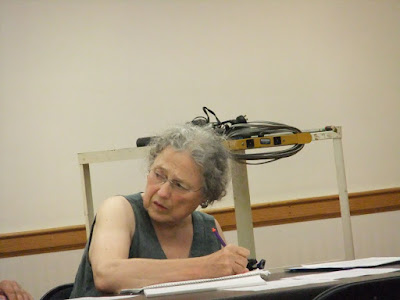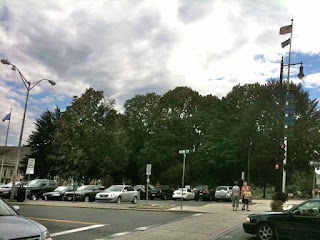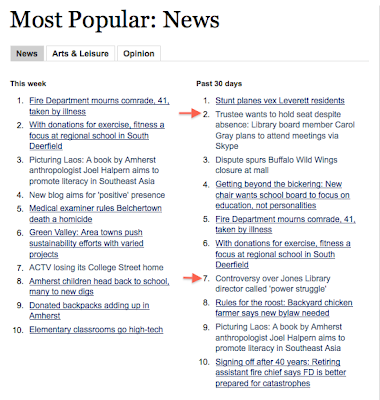Here, as promised, the wrap-up of the
Jones Library controversy:
Meeting of the Trustees, 13 August
Well, I’ve filled out my first postcard—have you?
Friday the Thirteenth did indeed prove to be an unlucky day for the Jones Library Trustees, who held their tensest meeting yet. They were subjected to a barrage of public criticism, the majority of it from big guns in the library community. It was probably not how they expected the day to go, for they began with what they evidently considered a preemptive attack.
Addressing the 30-odd people in the audience as the session began (fifteen minutes late), Chair Pat Holland explained, for the benefit of those present for purposes of public comment, that she would read a letter from the
Massachusetts Board of Library Commissioners, just recently received. It was from the desk of Rob Maier, Director of the Board, and contained MBLC’s response to the
citizen petition asking for creation of a special committee to review the practices at the Jones, particularly the Director evaluation process, and more generally, the relation between trustees, director, and staff. (For the record, I know Rob Maier because he is also the
Chair of the Board of the
Massachusetts Center for the Book, on which I serve. He is a model of calm demeanor and common sense.)
The letter explained, concerning the relationship between trustees and director, ”there is extensive professional literature on these roles and it is remarkably consistent”:
• There is a clear distinction between governance and management: one party sets the policies and the other carries them out.
• The board does not determine policy independent of the director, and the director does not carry out policy independent of the board (he enclosed documents on this issue).
• MBLC does not have the authority or the staff to carry out investigations of individual institutions or trustees, and his suggestion was therefore to engage a consultant (he would be happy to recommend one via the new regional system) to work with all parties in order to address “both process and content and to establish a clearer understanding of the lines of communication” among director, trustees, and staff.
• His concern about a review committee was that it would take too long both to form itself and to reach a decision. Time was of the essence, and for that reason, a single consultant was the simpler and preferable choice.
• He concluded, “I congratulate you on confronting these issues so that you can focus on services that your community uses and needs.”
The Trustee Evaluation Committee evidently considered the letter a sort of victory because it rejected the petitioners’ specific demand, and the Board Chair’s prefatory remarks hinted at a feeling of satisfaction. However, a closer reading is in order.
As librarians and library trustees should know, reading is a learned skill. The letter was not a simple victory for the trustee majority and a slap at the petitioners (though it was not the opposite, either). It was a politic way to avoid becoming embroiled in a local controversy, though it also no doubt reflected the financial and institutional realities, which conveniently provided the pragmatic rationale. It’s exactly the sort of letter that a consummate professional, maintaining the requisite tone of neutrality, is expected to write, on the assumption that everyone is skilled enough to read between the lines. Basically, the letter lays down the law: it says that the issue of division of labor between board and director/staff is well established, clear-cut, and in short, anything but mysterious. It closes, despite the sugar-coating of congratulatory language, with the order to both parties: Get your house in order. Sooner rather than later.
In any case, the reading of the letter did nothing to dampen the spirit of criticism and even rebellion among the public. Speaker after speaker rose to denounce the practices of the current board. There was no room for ambiguity here. It is significant that, at each of the public comment sessions, the statements have been uniformly critical. Voices supporting the current policy have simply failed to materialize; no one has risen to speak in favor of the actions of the Evaluation Committee. In the context of otherwise vocal and divisive Amherst politics, that in itself should be an alarm signal.
Jones employee Tina Swift, President of local
SEIU 888, undaunted by the trustees’ salvo, responded with a bombshell of her own: at lunch today, the workers
voted to express “no confidence” in the Evaluation Committee. Reiterating the previous charges of a biased and coercive review process, they in addition charged the triumvirate with creating “a hostile work environment” in which workers suffered stress due to “fear of reprisals for speaking up, constant verbal harassment of their director, and the general bullying tone.”
 |
| SEIU's Swift: "a hostile work environment," "no confidence" |
Chair Pat Holland politely assured Ms. Swift, "Thank you, and we will take that very seriously."
(I am sure the trustees will indeed have to do so, sooner or later. Three accusations of violations of workers' rights by a major union are nothing to be trifled with—or should not be in a town where many people consider themselves “progressives” and friends of the workers. Many of us here watch
union issues very closely, the more so in a climate of rising
indifference or even hostility toward organized labor.)
Next came a parade of respected professional librarians from outside the Jones.
• Willis Bridegam, the former director of Amherst College's
Robert Frost Library, expressed alarm because:
—there is “a general perception that the Jones Library trustees are in a crisis situation”
—there is “lack of consensus,” as the Evaluation Committee is meeting with criticism from both the labor union and individuals
—“it is fair to suggest that the working relationship between the trustees and the Library Director is strained, to say the least”
—the trustees “do not understand the appropriate limits of their responsibilities”
— “unless the problem is addressed quickly, the problem will become worse”
— “collections, staff, and services are excellent and we want to keep them that way,” but “no library can work well” under such circumstances
 |
| Former Amherst College Library Director Bridegam: "Jones Library trustees are in a crisis situation" and “do not understand the appropriate limits of their responsibilities” |
• Retired librarian Tamson Ely, explaining that she had studied the trustee minutes in detail, declared, “I am just appalled at the tone” of the documents and the attitude they display toward director and staff.
 |
| Librarian Tamson Ely: "I am just appalled" |
•
Hampshire College reference librarian and President of the
Jones Library Friends,
Bonnie Vigeland, expressed concern at the evaluation process and praised Director Bonnie Isman for her dedication to the welfare of collections, staff, and public alike.
 |
| Jones Friends President Vigeland: "concern" over trustee action, praise for Director Isman |
• Retired longtime
Hampshire College Director of Library and Information Services Gai Carpenter (who continues to serves on accreditation committees throughout the northeast) declared, “We didn’t need the issue of the evaluation of the Library Director to raise concerns about the Jones Library.” One had only to pick up the local newspaper on any given day to see reports on new controversy surrounding the trustees, she drily observed. She added that, as a member (and Clerk) of the Historical Commission, she had been surprised and taken aback to see that bits and pieces of proposals for
Community Preservation Act funding were being presented by the trustees when in fact the Director was present and the task should have been part of her domain. I “have been more than a little alarmed by that,” she said, and by articles in the newspaper, regularly reporting “trustee x is doing this.” This is about “an inappropriate exercise of trustee responsibility,” she asserted.
 |
| Retired Library Director Gai Carpenter: "more than a little alarmed" by "inappropriate exercise of trustee responsibility" |
Chair Pat Holland, courteous and unflappable as always, again expressed her characteristic gratitude to those present: “Thank you, what we are going to do now is move directly on to the endowment.” Clearly, with this full agenda, it was going to be a long meeting.
Emotions flared up again when trustee Chris Hoffmann, as he had promised, brought forward a motion asking the trustees to declare their acceptance of the
Code of Ethics of the Massachusetts Board of Library Commissioners. Trustee Kathleen Wang seconded the motion. You wouldn’t think that asking a town body to accept the code of ethics of its professional parent organization would be a controversial. But this is Amherst, where everything assumes a political character.
Trustee Carol Gray objected, and sought to table the action on several grounds: it was not on the agenda, the document contained some portions that were not from Massachusetts and needed to be carefully compared with state and local policies, and so forth.
Trustee Hoffmann, brandishing a copy of the relevant state documents, countered by explaining that he had in fact announced his intention before the meeting. His main point, he said, however, was substance. Speaking with evident emotion, he declared, “We are clearly a dysfunctional board right now,” with individuals going off and “doing their own thing.” We need to face up to our dilemma, he asserted: admit that we have a problem, seek help from a consultant to learn what we are doing wrong, and learn proper teamwork: “we need to rebuild.” For a start, then, he said he was just asking for a return to the basics in the form of an endorsement of the Code. Some trustees, he asserted, think they are special, and can follow their local bylaws or other doctrines and not obey the broader rules of the profession.
 |
| Trustee Hoffmann displaying the Code of Ethics |
Ms. Gray rejected that accusation, saying, “I agree that we are a board that should act as a board,” but, as always trying to take what she refers to as the high road, she denounced Mr. Hoffmann for bad behavior: “to go the press without going first to the board is inappropriate and divisive and I hope we can get past that divisiveness.” Moreover, “to adopt a 100-page document without having the board look through it would be irresponsible.”
 |
| Trustee Gray: Hoffmann "inappropriate" and "irresponsible." "I hope we can get past that divisiveness." |
Mr. Hoffmann responded with obvious irritation by implying that this was disingenuous: Shouldn’t she have familiarized herself with the Code of Ethics—which was moreover only 1 page in length? “if you don’t think you can endorse even the simplest, most basic code of ethics, fine.”
When asked whether he would voluntarily withdraw his motion until a later date, he replied tersely, “No, I did that before” (a reference to his
attempt, some five months ago, to raise a similar issue). Trustee Kathleen Wang, a thoughtful but usually quiet voice on the Board, said, “I would really recommend to the trustees that we vote on this tonight, because not voting on this . . . might give the clear impression that we are not concerned with ethics.” We “should just accept this before we even run for office.” There followed a conversation about the extent to which trustees had or had not received proper orientation for their duties.
Chair Pat Holland eventually intervened: asking us all to sign on to a code of ethics, she said, implies that we have not already adopted a code of ethics. On the contrary, she felt that everything “has been done” in conformity with a code of ethics, including the work of the evaluation committee. Mr. Hoffmann’s motion, she said, was “simply an exercise in attacking the work of the evaluation committee.” Clearly, as she argued, his move had been a political one. What was not clear was who gained more from the confrontation.
The debate about the extent of trustee orientation flowed along for a while. Sarah McKee acknowledged, "I am a person who did some things this past year that I have been told were inappropriate for a trustee." If so, she said, it was at times in concert with the Library Director and staff and only because no one had informed her otherwise. Mr. Hoffmann seemed heartened by this statement and, saying, "I hope we can all come together," accepted some responsibility for not having called attention to problems sooner. "It's easy to think you have powers you don't." Trustee McKee explained, for example, “
We didn’t know that there was a hiring policy until mid-way through the year.” Only after speaking with a representative from the state did she discover that there in fact was one, and it was ten years old. Thanking the Jones staff for putting together a policy notebook, she affirmed, “it’s very helpful to know what the policies are.” Director Isman explained that orientation—including both documents and tours of the facility— for new trustees had been available although they had not necessarily availed themselves of it.
 |
| Trustee McKee: "helpful to know what the policies are" |
The conversation ebbed and flowed for a while longer in this manner. Eventually, the trustees voted, 3 in favor (Gray, Holland, McKee), 2 against (Hoffmann, Wang), to table discussion of the code of ethics until the next meeting.
 |
| Trustees Gray and Holland |
The conversation then turned to the mundane monthly business.
I had to leave a 5:30 because the two hours—the nominally allotted time for the meeting—on my parking meter had run out and I had a life to attend to as I prepared to leave for an annual book-studies conference in Europe. Already at 5:00, a reporter had asked another audience member, “Do they always run this late? They’re 45 minutes behind schedule.” Her answer was a resigned, "Yes," par for the course.
Reports indicate that the trustees concluded by reporting that the Evaluation Committee had done its work and the Director's evaluation was now in the personnel file. Discussion then turned on the extent to which confidentiality might still pertain (especially to discussion of professional competence vs. the evaluation, as such), a question that apparently required further consultation with Town Counsel.
Not quite the final chapter, then.





























